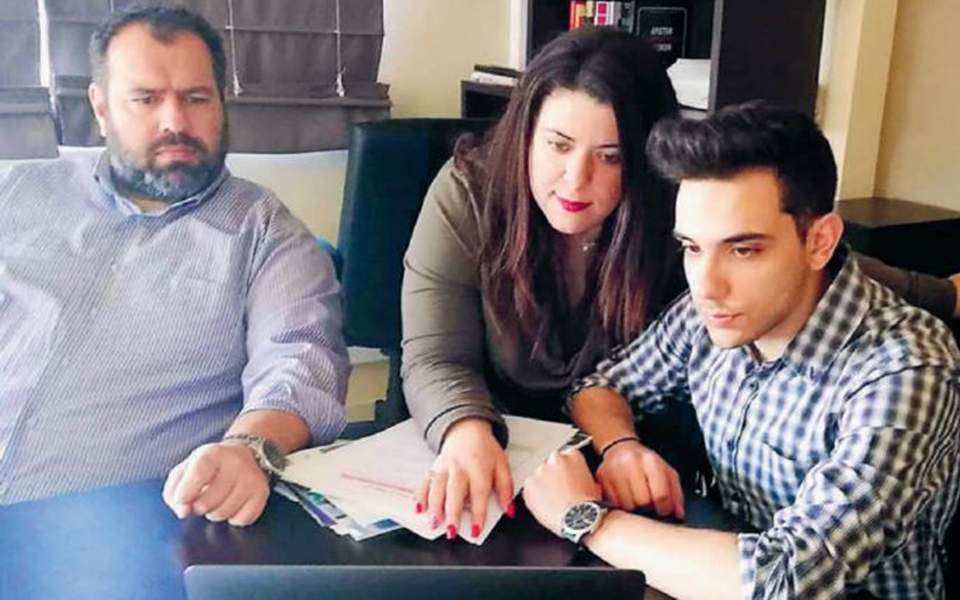Greek startup facing legal action from Facebook

January was a good month for the team behind Greek startup Face Traveller. At least it was until their troubles with Facebook began. Up until that day, their efforts seemed to have started paying off.
They had been selected at the start of the month as one of 100 companies to benefit from the Athens Startup Business Incubator (THEA) – an initiative of the Athens Chamber of Industry and Commerce – and there was a good deal of interest in their digital travel application and other projects they were working on. Needless to say, they were shocked when they received a phone call on the evening of January 29 from a lawyer representing the social media giant in Greece.
Alexandros Ioakeimidis, one of the founders of Face Traveller, was just about to enter the classroom at the private cramming school where he teaches, when the call came. “It has recently come to our attention that you have filed for a trademark with the European Union. Facebook has some questions regarding this issue and regarding yourselves,” the lawyer, whose name has not been made public, told him. “I don’t why, but I froze. God knows how I was able to get through the lesson,” Ioakeimidis tells Kathimerini of his response to the call.
That same night he met with his partners Babis Baroutas and Katerina Paliodimou to discuss the call and a letter that they had also received on the same issue. The missive was basically an outline of Facebook’s influential role as a global social media leader and a series of questions concerning what the Greek firm planned to do with its trademark. It said that several companies had tried to use the terms Face and Book in the wake of the social media provider’s success and suggested that the name Face Traveller could cause “confusion.” It also asked for a response from the Greek firm by February 8, 2019 at the latest.
“Our initial feeling was that they were trying to intimidate us into changing our brand name. But neither the Face Traveller name nor the logo have anything in common with Facebook,” says Ioakeimidis.
The idea for Face Traveller was born on a spring day in 2016 during a trip to Rome. Baroutas and Paliodimou were sightseeing and the former was having to translate for the latter, who doesn’t speak Italian. That prompted him to wonder why there wasn’t a mobile phone app providing descriptions of major historical sites in Greek. “It was an aha moment,” says Paliodimou. “By the time we returned to Athens we had convinced ourselves that this was something we needed to try doing.”
The pair spoke with Ioakeimidis and set the plan in motion to design a digital application offering tours of the world’s ancient monuments in 14 languages. And the name? “We don’t want tourism to be a faceless experience, so we chose Face Traveller as a name that was representative of the notion of personalization,” Paliodimou explains.
They then started the process of registering their trademark and brand locally and globally. These are different processes that ended up costing them more than 4,000 euros. The trademark was successfully registered with the Ministry of Commerce in Greece in December and they expected it to be registered in the European Union in February, so it was no wonder the letter and call from Facebook worried them so much.
They were hoping that the company would not apply for the trademark’s cancellation and spent almost all day on Friday, February 15 – the deadline for any objections to be filed – glued to their computer screens. The message they had been fearing came at 7.21 p.m. In an objection that ran to 50 pages, Facebook insisted that the Greek firm’s trademark would cause confusion among the social media service’s 1.8 billion users.
“We were worried but we tried to stay calm. The European agency would theoretically have two months to study the objection and decide whether to uphold it or not. Then we would have another two months to figure out some kind of solution. If we couldn’t reach a deal, the decision would rest with the European authority. We could, of course, also take the matter to court,” they explain.
Previous objections
Facebook, they discovered, had expressed similar objections in the same manner on numerous occasions. “It even took a Norwegian website for erotic films [called Faceporn] to court in California – and lost.”
Last week, Facebook’s motion for cancellation was accepted and now the two sides need to start talking, though the three Greeks are not hopeful of a solution. The company’s lawyer, they said, advised them to back down or face judicial proceedings. But the Face Traveller team has no intention of letting the matter go either. “We have paid and have already registered our trademark in Greece and we have also spent a lot of time and money establishing our brand over the past year. Most importantly, we like the name and it expresses us completely,” they say.
That said, they are not unconcerned about the toll a judicial battle could take. “We have an issue with regard to several competitions that are currently under way, as well as applications for funding. We don’t know which trademark we should be using for all this. And what about potential investors? How can we tell them that we’re in a legal battle with Facebook? The whole issue is nuts! Facebook is challenging a company that makes 70,000 euros a year when it probably makes 70,000 dollars a minute.”





